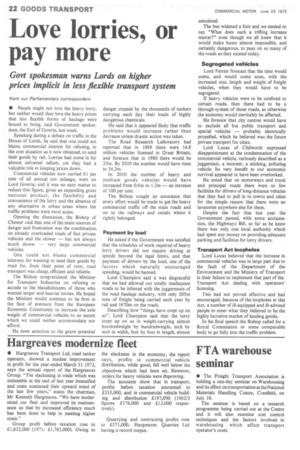Love lorries, or pay more
Page 24

If you've noticed an error in this article please click here to report it so we can fix it.
Govt spokesman warns Lords on higher prices implicit in less flexible transport system
from our Parliamentary correspondent
• People might not love the heavy lorry, but neither would they love the heavy prices that less flexible forms of haulage were bound to bring, said Government spokesman, the Earl of Gowrie, last week.
Speaking during a debate on traffic in the House of Lords, he said that one could not blame commercial interest for refusing, in the cost situation as it now obtained, to send their goods by rail. Lorries had come in for almost universal odium, yet they had a valuable role in keeping prices down.
Commercial vehicles now carried 61 per cent of all annual ton mileage, went on Lord Gowrie, and it was no easy matter to reduce this figure, given an expanding gross national product, the flexibility and convenience of the lorry and the absence of any alternative in urban areas where the traffic problems were most acute.
Opening the discussion, the Bishop of Chester said that one of the main sources of danger and frustration was the combination. on already overloaded roads of fast private vehicles and the slower — but not always much slower — very large commercial vehicles.
One could not blame commercial interests for wanting to send their goods by road for, from their point of view, road transport was cheap, efficient and reliable.
The Bishop congratulated the Minister for Transport Industries on refusing to accede to the blandishments of those who wanted larger and heavier lorries. He hoped the Minister would continue to be firm in the face of pressure from the European Economic Community to increase the axle weight of commercial vehicles to an extent which we could neither accommodate nor afford.
He drew attention to the grave potential danger created by the thousands of tankers carrying each day their loads of highly dangerous chemicals.
He said that it appeared likely that traffic problems would increase rather than decrease unless drastic action was taken.
The Road Research Laboratory had reported that in 1969 there were 14.8 million vehicles licensed in Great Britain, and forecast that in 1980 there would be 23m. By 2010 the number would have risen to 36.2m.
In 2010 the number of heavy and medium goods vehicles would have increased from 0.6m to 1.2m — an increase of 100 per cent.
The Bishop sought an assurance that every effort would be made to get the heavy commercial traffic off the main roads and on to the railways and canals where it rightly belonged.
Payment by load He asked if the Government was satisfied that the schedules of work required of heavy lorry drivers did not require driving at speeds beyond the legal limits, and that payment of drivers by the load, one of the factors which naturally encouraged speeding, would be banned.
Lord Champion said it was disgraceful that we had allowed our totally inadequate roads to be infested with the juggernauts of the road haulage industry, with only 205m tons of freight being carried each year by rail and 1670m on the roads.
Describing how "things have crept up on us", Lord Champion said that the lorry crept up on us in weight-carrying almost hundredweight by hundredweight, inch by inch in width, foot by foot in length, almost unnoticed.
The bus widened a foot and we tended to say "What does such a trifling increase matter?" even though we all knew that it would make buses almost impossible, and certainly dangerous, to pass on so many of the roads as they existed today.
Segregated vehicles
Lord Ferrier forecast that the time would come, and would come soon, with the increased size, length and weight of freight vehicles, when they would have to be segregated.
If heavy vehicles were to be confined to certain roads, then there had to be a through-system of those roads, as otherwise the economy would inevitably be affected.
He foresaw that city centres would have to exclude all but public transport and special vehicles — probably electrically propelled, which he believed was the future private transport for cities.
Lord Lucas of Chilworth expressed disappointment at the condemnation of the commercial vehicle, variously described as a juggernaut, a monster, a stinking, polluting vehicle. Its very benefit to our economic survival appeared to have been overlooked.
He noted that on motorways and trunk and principal roads there were so few facilities for drivers of long-distance vehicles that they had to pull in to towns and cities for the simple reason that there were no lavatories anywhere else for them.
Despite the fact that last year the Government passed, with some acclamation, the Highways Bill, so far as he knew there was only one local authority which had spent any money on providing adequate parking and facilities for lorry drivers.
Transport Act loopholes
Lord Lucas believed that the increase in commercial vehicles was in large part due to the fault of the Department of the Environment and the Ministry of Transport in their failure to implement that part of the Transport Act dealing with operators' licensing.
This had not proved effective and had encouraged, because of the loopholes in this Act, a number of ill-equipped and ill-advised people to enter what they believed to be the highly lucrative market of hauling goods.
In his final speech the Bishop called for a Royal Commission or some comparable body to go fully into the traffic problem.












































































































